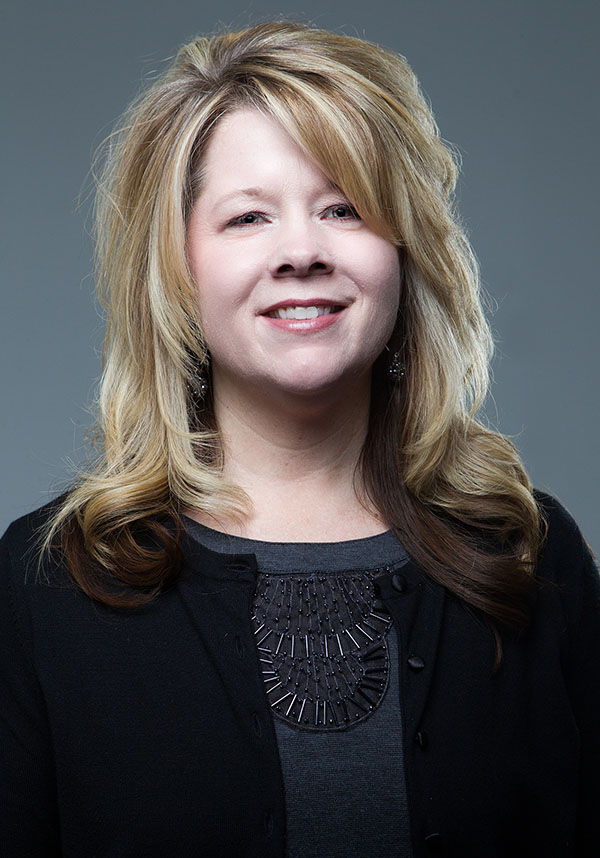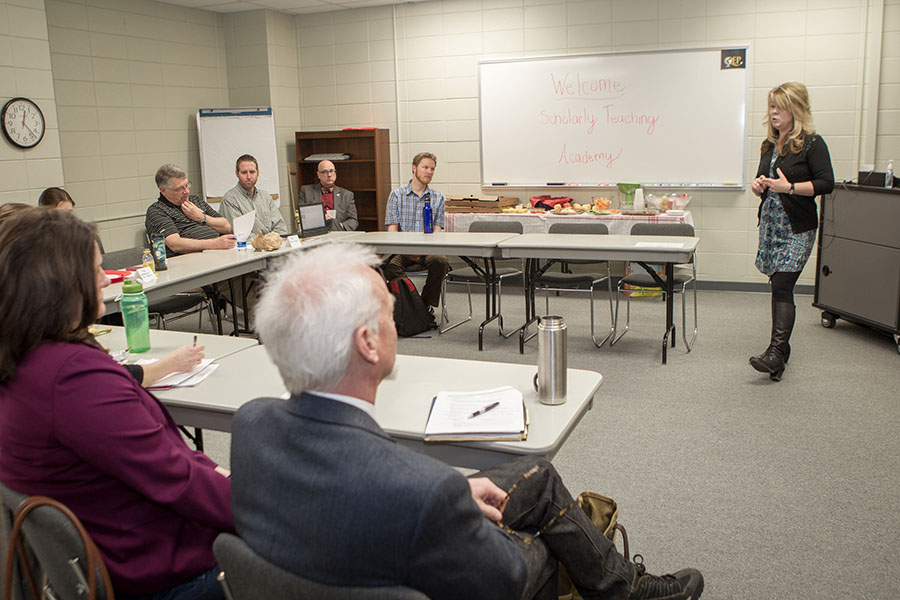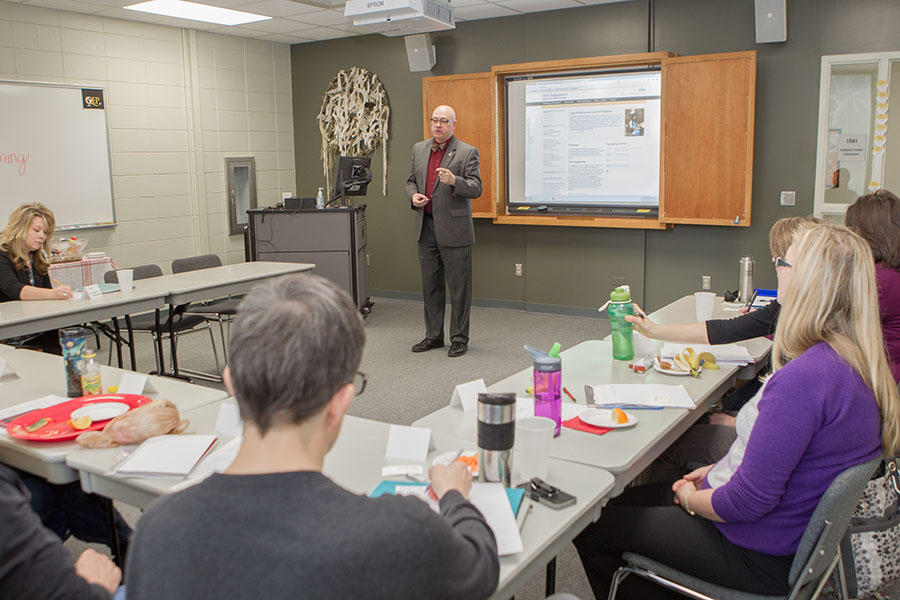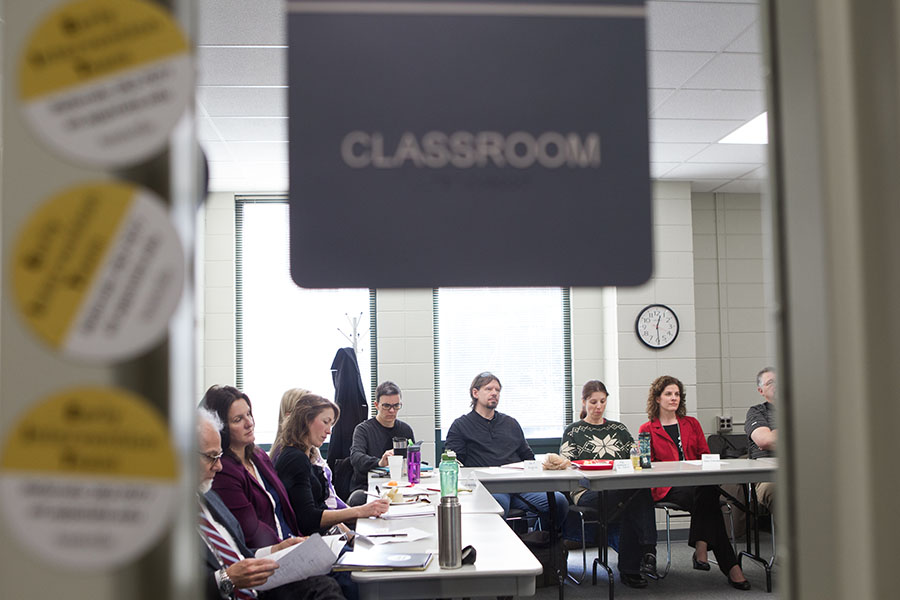BOONE, N.C. — Lecturer Barbara Michel loved the small, intimate feel of her First Year Seminar course for freshmen and wanted her larger introductory marketing class to be just as exciting for both her and her students. The course was a requirement for several majors, with some students more interested in the topic than others.
“It wasn’t fun to teach. I was not happy and engaged and neither were the students,” said Michel. “I wanted to improve student learning, engagement and enjoyment.”
She redesigned the course through a new, two-year Scholarly Teaching Academy at Appalachian. The academy gave her the resources and encouragement to make the course more focused on team-based learning and community building. The results: students were better prepared for class, spoke up more, and evaluated the course at or above the departmental average for all sections of that course each semester since.
“The atmosphere seems much smaller, more like a community,” Michel said of her redesign.
A chance to reflect and set goals
Michel was among six faculty members selected to complete the inaugural Scholarly Teaching Academy sponsored by the university’s Hubbard Programs for Faculty Excellence. The academy gives professors a chance to reflect on their teaching and set new goals in becoming accomplished, expert scholar-teachers – whether they are seasoned faculty or new or part-time faculty.
Participants spent the first year designing a plan to improve their teaching and the second year implementing it. The first cohort was recently recognized for their work, which resulted in:
- four redesigned courses
- six presentations at state, regional and national conferences
- three grant proposals
- publication of two journal articles
- a collective electronic portfolio of the faculty members’ work
Another 10 select faculty members are halfway through the program’s second cohort.
“This is quintessentially Appalachian,” Provost Lori Gonzalez said about the Scholarly Teaching Academy. “You can’t have the Appalachian Experience without faculty members who take their teaching seriously and understand there is an art and science to being an excellent faculty member. This program will make a big difference in the lives of our students.”
Personalized, individual study
Today’s college students, often called Millennials, differ from students even five years ago, Gonzalez said. “Faculty members have to understand the different ways students learn, how technology can facilitate learning and how they can approach their teaching in new ways,” she explained.
Dr. Tracy Smith, a professor of curriculum and instruction in the Reich College of Education, is the Scholarly Teaching Academy’s faculty consultant. While Appalachian faculty are recognized experts in their particular field and do well in the classroom, they may not have the latest information of how to reach today’s students, she said.
The academy is built around what faculty say they need, whether it is improvements in technology, course design or other aspects of their course. “It’s focused on them as learners and their development and interests,” Smith said.
“There is no one model of what good teaching looks like, depending on the context, your subject and your format. The individualized study that we do values the personal nature of good teaching and the relationship between teachers and students, and between students and students, and how that is bound in context.”
Faculty must apply to participate in the Scholarly Teaching Academy. Those drawn to the opportunity are curious, determined and humble individuals who relish the chance to make students’ education the best it can be, Smith said.
“The more they know about teaching excellence the more they realize it’s a journey, it’s moving to the next point. They have more of a confidence of their knowledge of effective teaching,” she said.
Dr. Kate Brinko, director of faculty and academic development, said Smith “created an incredibly rich learning environment for her colleagues and then gave them the freedom to focus on and learn what was most important to them. There are now ripple effects as they share what they learned with their colleagues.”
In addition to Michel, the following faculty completed the Scholarly Teaching Academy during 2011-13:
- Dr. Geri Miller, professor with 21 years at Appalachian – developed a new approach to using iPads in a graduate-level counseling course.
- Dr. Vachel Miller, assistant professor with six years at Appalachian – enhanced incorporation of global education and social justice in his teaching of educational leadership.
- Dr. Reeves Shulstad, associate professor with five years at Appalachian – improved students’ engagement and class participation in large lecture-hall course in the Hayes School of Music.
- Kyle Thompson, lecturer with four years at Appalachian – strengthened the professional development of nutrition majors prior to their internships, including creating a white-coat ceremony to mark their move from the classroom to clinical setting.
- Dr. Tracy Smith, professor with 13 years at Appalachian – developed and delivered a hybrid course for faculty who plan to teach middle grades teacher education in a hybrid online environment.
Participating in the second cohort for 2013-15 are:
- Dr. Bob Eskridge, Department of Government and Justice Studies
- Dr. Kim Becnel, Department of Leadership and Educational Studies
- John Henson, Department of Curriculum and Instruction
- Dr. Pia Albinsson, Department of Marketing
- Dr. Tracy Goodson-Espy, Department of Curriculum and Instruction
- Debbie Poulos, Department of Communication
- Jon Pope, Department of English
- Jamie Anderson, Department of Finance, Banking and Insurance
- Jennifer Dalton, Department of Communication Sciences and Disorders
- Katie Adams, Department of English
What do you think?
Share your feedback on this story.
About Appalachian State University
As a premier public institution, Appalachian State University prepares students to lead purposeful lives. App State is one of 17 campuses in the University of North Carolina System, with a national reputation for innovative teaching and opening access to a high-quality, cost-effective education. The university enrolls more than 21,000 students, has a low student-to-faculty ratio and offers more than 150 undergraduate and 80 graduate majors at its Boone and Hickory campuses and through App State Online. Learn more at https://www.appstate.edu.
















